It was a single day, and yet there was more to come. While coming back from
Halebid our GP-ESS ditched us, so we went back the way (towards
Hagare) we had come, instead of taking the straight route from
Halebid to
Belur. Next time we know better. :)
 |
| (Don't miss the Dwarasamudra lake behind the Halebid temple!) |
But this long route led to another experience. We went, mainly out of curiousity, to visit a temple on a small hill '
Pushpagiri' on the way to the midpoint
Hagare. The hill is barely a few kilometres away from the
Halebid wonders, but doesn't house any temple complex corresponding to what we gaped at in
Halebid. As we went upstairs to visit the most prominent temple there, it struck me that here the adage 'Cleanliness is next to Godliness' is definitely not followed. The temple is neither dirty nor is it exceptionally clean, but the fact that the packaging of the material used to pray was strewn around the very place of praying left me aghast, specially because a dustbin is hardly a few feet away from the spot!!! Thus followed a minute, but very satisfying spotfix à la TUI (
The Ugly Indian).
Just to be clear: The 'blue' corner in the 'after' picture is not garbage, it's my scarf. :D
We then continued to Belur to visit another masterpiece of the Hoysala dynasty and reached it in an hour or so. Having found a place to park our red riding hood (a cakewalk compared to parking in Delhi and Bangalore!), we walked over to the darling of the masses - the Belur temple. From outside the façade glinted in the afternoon sun, the architectural beauty being gazed upon lovingly through the gaps in the clouds by those in heavens above. But it didn't particularly impress me much at that time (I could barely see the photo I'd taken against the sunlight!) and thus my expectations were lower, just like in Halebid. Which, I always feel, is a good thing and a surefire way to be pleasantly surprised later. :D
 |
| The gopuram from outside |
As we entered the temple, my first instinct was to turn back and look at the entrance (a 7 storey
gopuram) to see its details. It was majestic from inside despite the restoration works being carried out. There was also a pillar right in front of the entrance (a little camouflaged here) that looked impressive, but was stubbornly refusing to fit into any frame. That brought out my stubborn streak and I made sure I captured it in one. :D
 |
| The gopuram from inside |
There's a fascinating story about the other pillar outside the temple in the premises. They say that the second pillar called
Garuda stambha (stambha = pillar) does not have a base and that one can pass a thin sheet of paper between the pillar and its so-called base (No, we didn't try that this time. I'm not sure if it's allowed anymore.). This reminded me of the non-corrosive
iron pillar in the
Qutab Minar Complex in
Delhi. Ancient architectural marvels abound in
India!
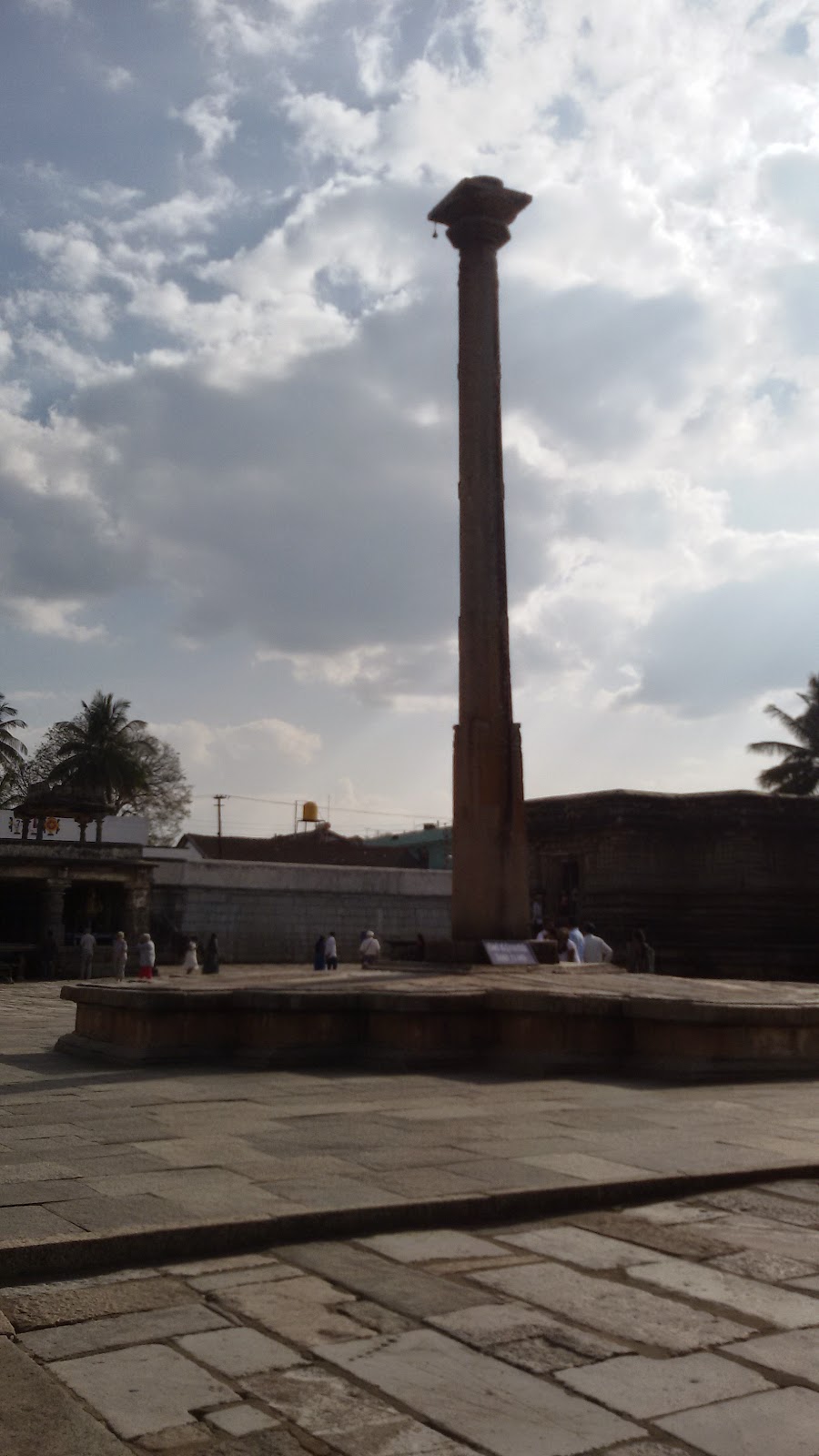 |
| Garuda stambha |
We then proceeded to take off our shoes as per tradition and ventured inside the temple built on the trademark star-shaped raised platform. There is a certain sense of spirituality in going around barefoot on stone (specially when it's warm and sunny :D), or maybe it is accupressure that leads to the feeling of wellbeing. Maybe it's both. :)
 |
| Another view of the star-shaped raised platform of the main temple |
The
Hoysala dynasty was undoubtedly a big promoter of art and artists, specially sculptors. Oh, and there is a legend behind the name
Hoysala, which has inspired some of the sculptures in the temples built by the dynasty. It is supposed to be a call - '
Hoy Sa'la', meaning 'Strike,
Sa'la' encouraging the courageous leader of the dynasty '
Sa'la', as he killed a tiger. And this pose has been captured and used as an emblem in both
Belur and
Halebid temples built by the
Hoysala dynasty.
 |
| The 'Hoy Sa'la' emblem at the entrance - in the left corner and in the centre |
Once inside, we had to remember everytime to close our mouths - the detailed carvings tend to have that effect. :D As with most of the temples of that period (it was built in 1116-1117 A.D.), this one too had elaborately carved ceilings, a sight to delight one's heart (but not at all good for the head or the rest of the body, as one moved with eyes glued upwards. Multi-tasking has its limits. ;) )
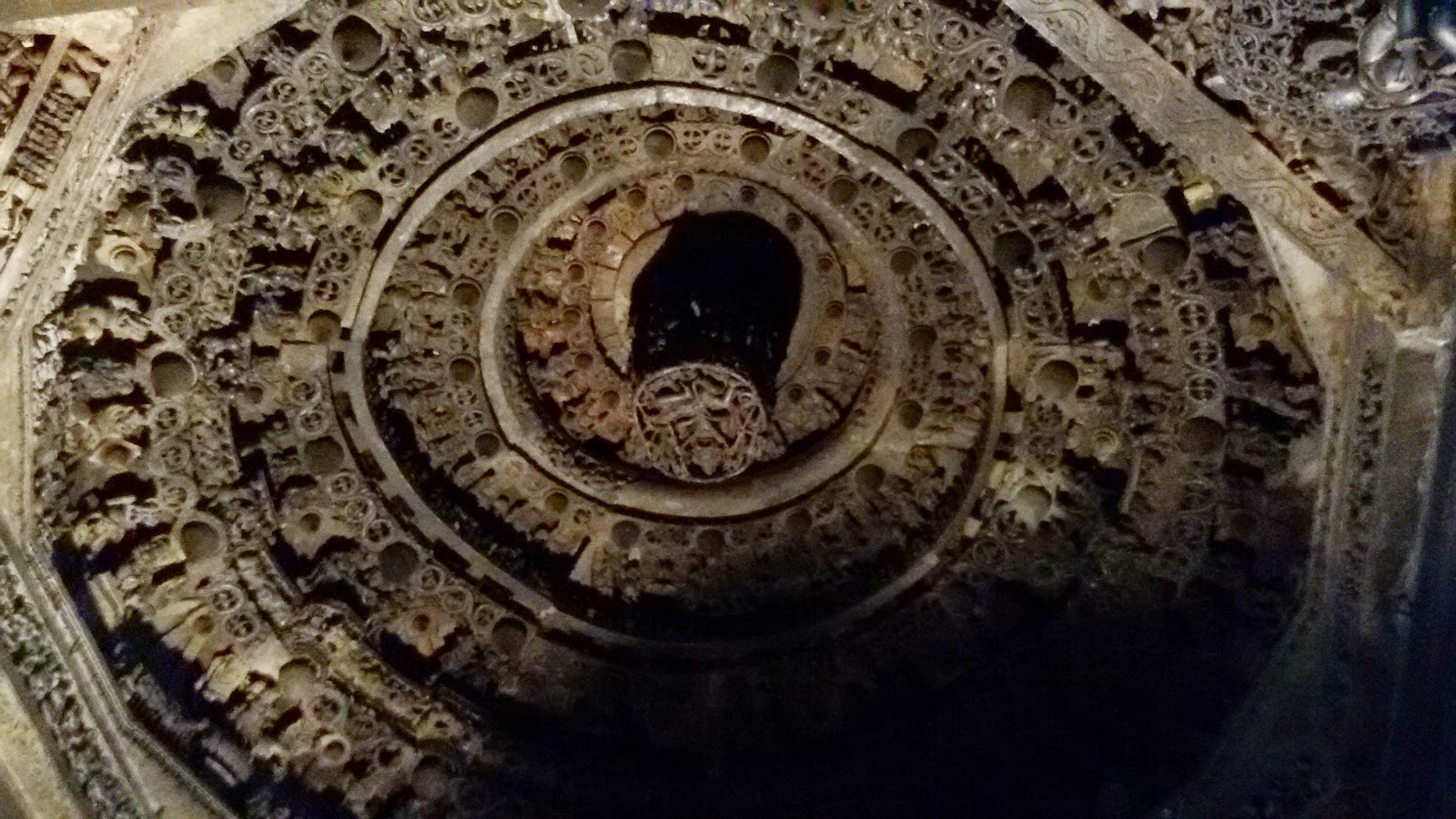 |
| A Ceiling to see! |
What details - inside as well as outside! There are celestial nymphs in various poses on the upper outside part of the temple, connecting the wall to the ceiling. And there is a row of 650 (I'm told. I didn't count them personally, but it does seem to be true. ;) ) elephants near the base of the temple on the outside, with each of them striking a unique pose. No wonder it took about 100 (103 to be a bit precise) years to complete this riveting engineering and architectural marvel!
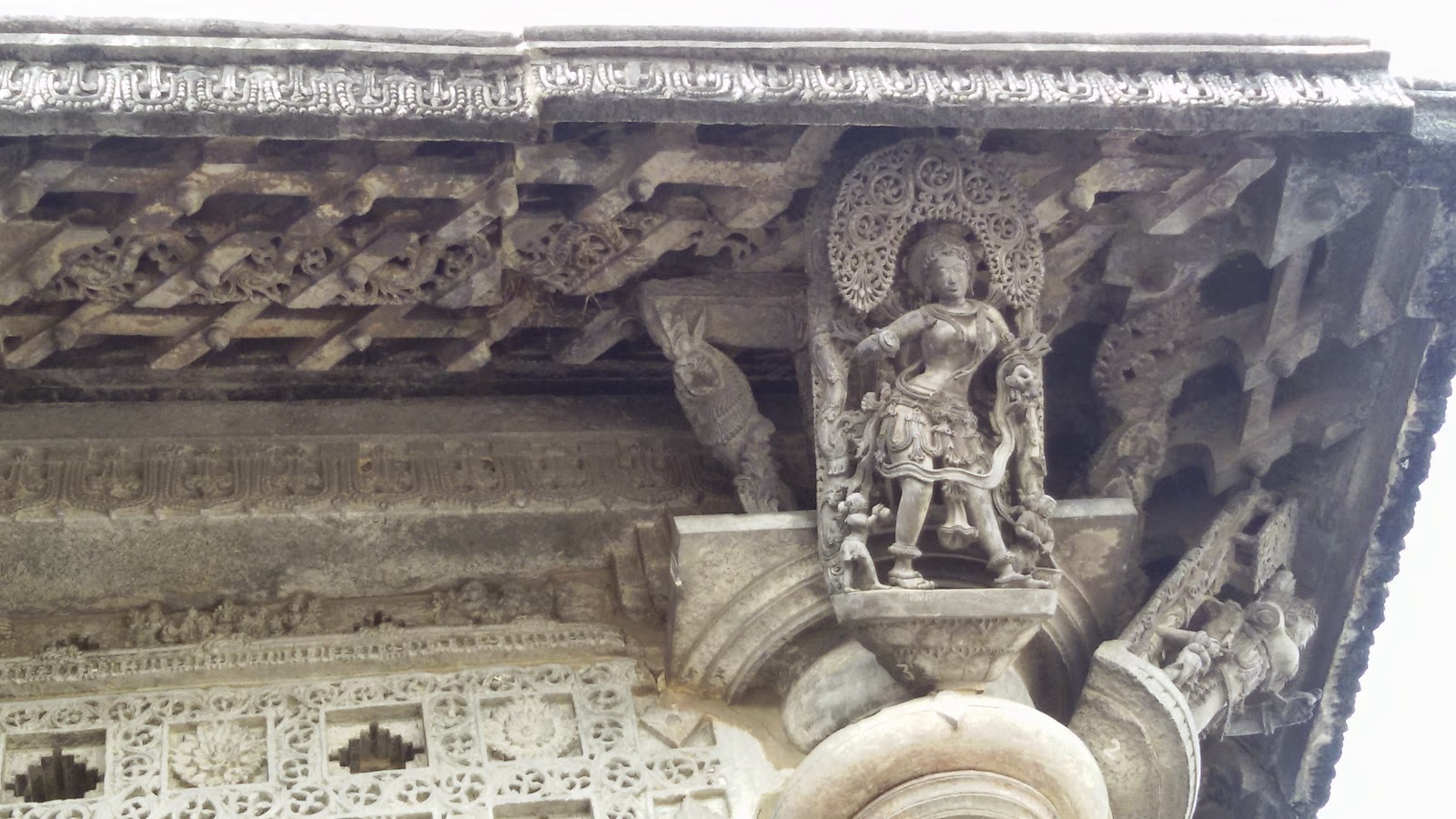 |
| Celestial nymphs adorning the external walls of the temple |
We moved on, noting the different rows of musicians, dancers, animals and Gods. The
apsaras danced in stone supported by the ornate carvings - Do they ever realise how many people they have delighted over the years?! :)
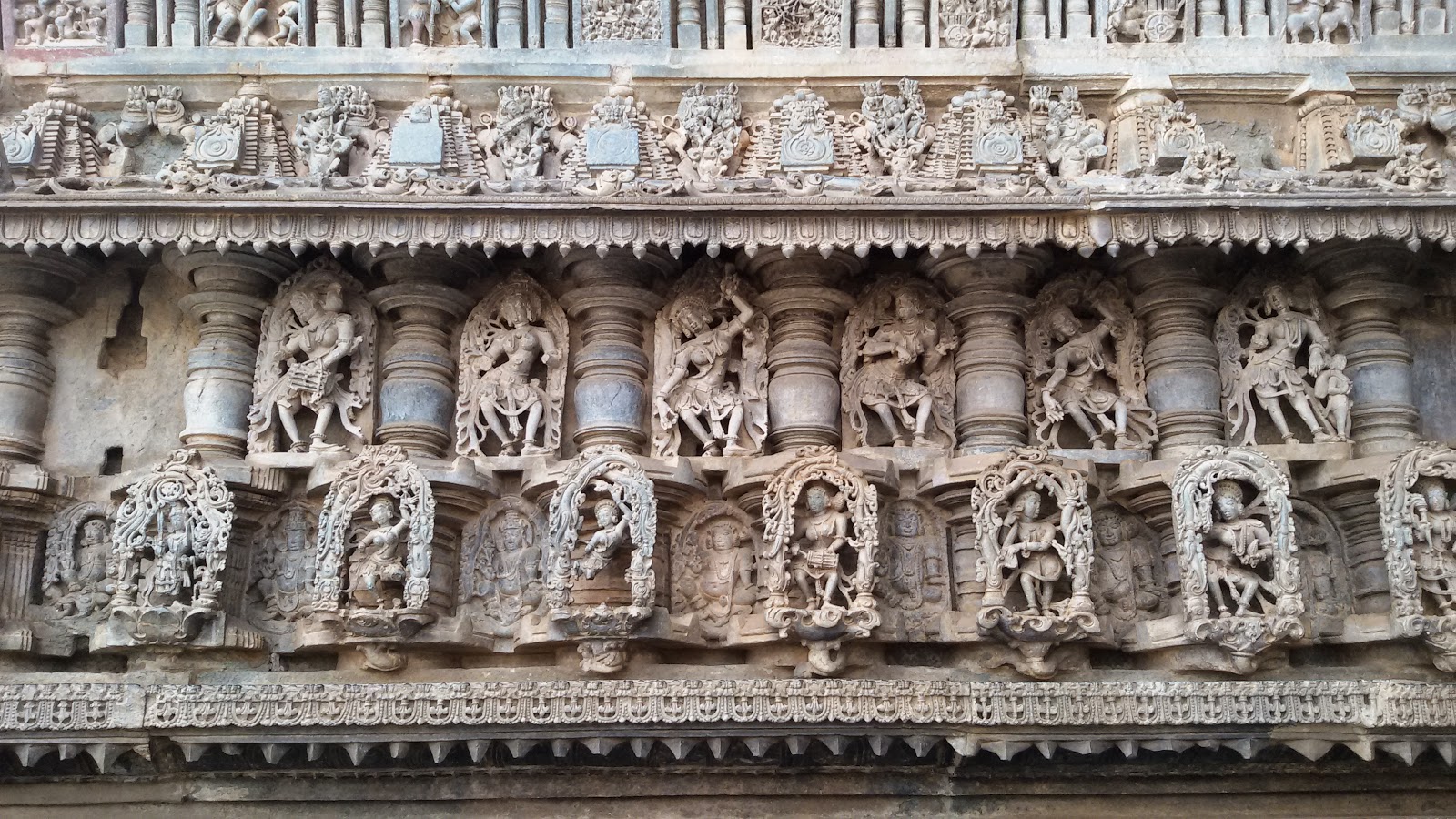 |
| Intricate carvings |
All my efforts to capture Ma & Pa against the awe-inspiring backdrop were unsuccessful (someone or the other kept on passing by) till I found a door to the temple that was not frequented by the throngs of the visiting humanity (Before that my parents had a short glimpse into the hard life of fashion models and I had a brief vision of the travails of a cajoling photographer! ;) ). And thus came about the perfect picture frame, which was worth the 3 day trip including the 2 night stay and more than 500 km in terms of driving pleasure. :)
 |
| Worth framing, isn't it? :) |
The late afternoon mellowed by the winter sun (what they call winter in
Karnataka, we call spring in
Delhi ;) ) coupled with the magnificent surroundings made it a sight to remember. I would think back fondly on the time spent here walking back and forth, enjoying the ambiance, taking dozens of pictures of the serene monument and not worrying about the time spent there - talk about flexible, private and enchanting trips! :D
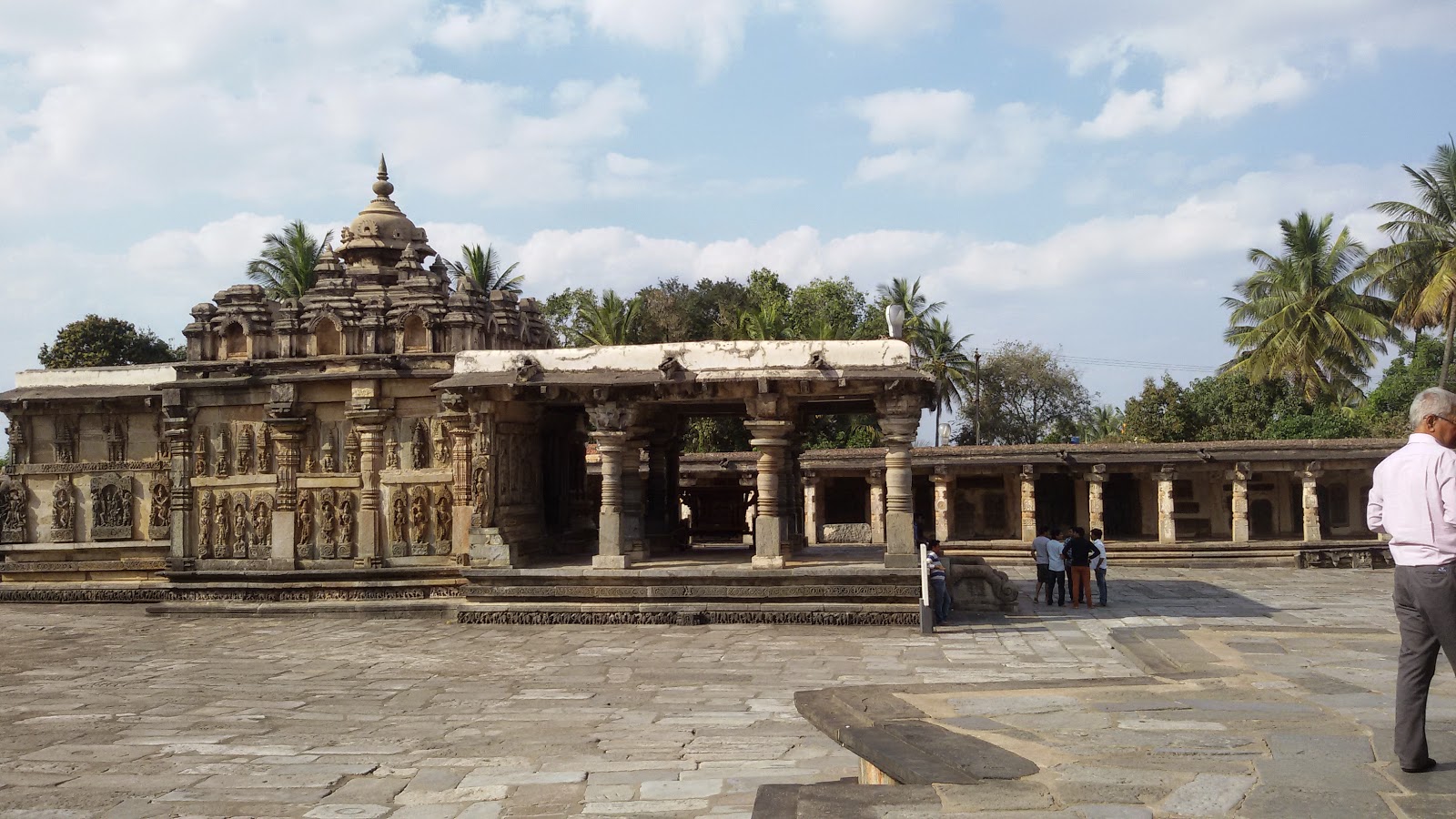 |
| A bit of the star-shaped raised platform from another angle |
My most favourite of the lot (actually I have a lot of most favourite photos from this trip, even though I'm bending the rules of grammar to stand by this stand of mine :D) is the one, where one can see a woman in a red sari passing by the temple basking in the sun, the clouds intermittently floating and stopping to wonder at all the fuss happening below and the green, swaying trees adding to the colour spectrum...
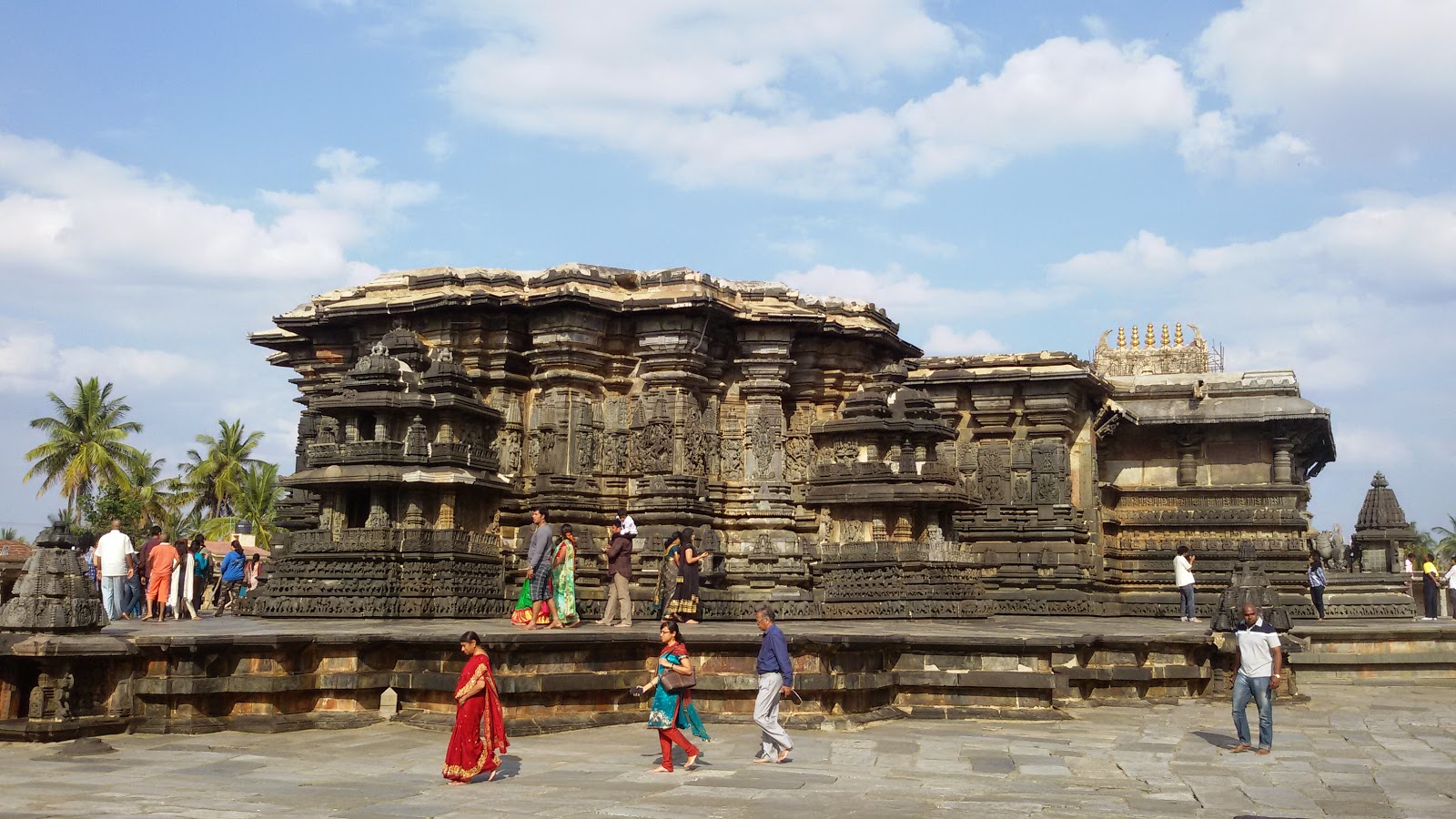 |
| Serene masterpiece! |
We strolled out of the temple, assuaged our hunger-ravaged tummies (that suddenly remembered to growl their displeasure aloud) and wondered what to do next. There is a dam nearby that could have been another highlight of the trip. But our tired limbs and wonder-filled minds (after experiencing
Halebid and
Belur in one day!) called for a halt to sightseeing and we drove back to our base in
Hassan.
The next day was the Republic Day holiday in
India and we were planning to drive back to
Bangalore via
Shravanabelagola. More on that in another part...













